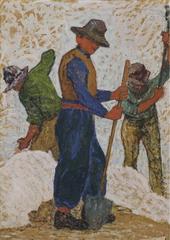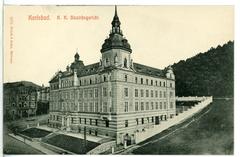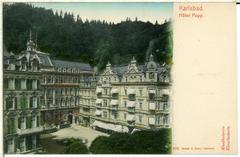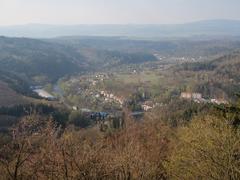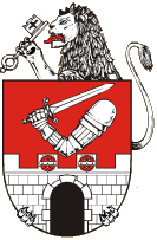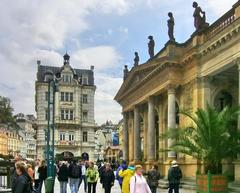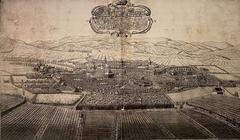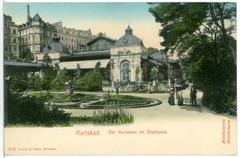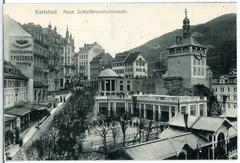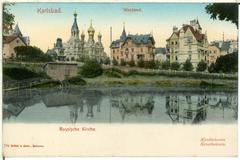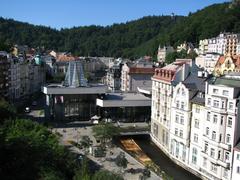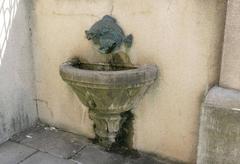
Statue Of Hygieia In Karlovy Vary, Vřídelní Kolonáda
Statue of Hygieia: Visiting Hours, Tickets, and Comprehensive Guide to Karlovy Vary Historical Sites
Date: 04/07/2025
Introduction
The Statue of Hygieia, situated at the heart of Karlovy Vary’s renowned spa district within the iconic Vřídelní Kolonáda (Hot Spring Colonnade), stands as a timeless symbol of health, wellness, and classical heritage. This emblematic statue not only celebrates the city’s centuries-old tradition of healing through mineral springs but also weaves together mythology, art, and the enduring spa culture of Karlovy Vary. Cast in 1878 by Viennese sculptor Vincenz Pilz and unveiled in 1879, the statue honors Karlovy Vary’s prominence as a world-class healing destination and the therapeutic power of its famous hot springs (Karlovy Vary official site).
This detailed guide provides everything you need to plan your visit, including the statue’s history, visiting hours, ticket information, accessibility details, practical travel tips, and highlights of nearby attractions. Whether you’re a history enthusiast, art lover, or spa seeker, this resource will help you make the most of your experience in Karlovy Vary.
Table of Contents
- Historical and Cultural Significance
- Classical Symbolism and Spa Culture
- Artistic and Architectural Context
- Visiting Hours, Tickets, and Accessibility
- Nearby Attractions and Travel Tips
- Community Identity and Local Traditions
- Educational and Interpretive Value
- Preservation and Heritage
- Frequently Asked Questions (FAQ)
- Conclusion and Next Steps
- References
Historical and Cultural Significance
The Statue of Hygieia is more than just a decorative element; it is a cultural and historical focal point for the city. Hygieia, the Greek goddess of health and cleanliness, is closely associated with preventive medicine—a fitting patroness for a city famed for its healing waters. The statue, cast in 1878 at the renowned Anton von Fernkorn foundry in Vienna and installed in 1879, highlights Karlovy Vary’s emergence as a major spa destination in the 19th century (Karlovy Vary official site).
Her depiction—seated and lightly draped, offering a bowl to a serpent—echoes ancient healing traditions and the city’s enduring spa philosophy. This iconography connects Karlovy Vary to a broader European fascination with classical antiquity and the ideals of health and balance (archaeologymag.com).
Classical Symbolism and Spa Culture
Hygieia’s image is deeply integrated into the local spa culture. In Greek mythology, she is the daughter of Asclepius, god of medicine, and her very name is the root of the word “hygiene.” Her association with the serpent—a universal symbol of healing and renewal—reinforces the importance of preventive care, cleanliness, and holistic wellness (Pantheon: Hygieia).
Karlovy Vary’s spa rituals, from sipping mineral water to participating in specialized treatments, reflect the ideals that Hygieia embodies. The statue’s presence within the Vřídelní Kolonáda serves as a daily reminder of the city’s commitment to health and rejuvenation (Audiala guide).
Artistic and Architectural Context
The statue exemplifies the neoclassical style popular in late 19th-century Europe, harmonizing with the cast-iron and glass architecture of the Vřídelní Kolonáda. The modernist reconstruction of the colonnade between 1969 and 1975 by architect Jaroslav Otruba preserved classical elements, ensuring that the statue remained a central and unifying feature (audiala.com).
As visitors enter the colonnade, Hygieia’s serene expression and symbolic attributes greet them, bridging the gap between history and modern spa culture (commons.wikimedia.org).
Visiting Hours, Tickets, and Accessibility
Location
The statue is located at Vřídelní 703/1, 360 01 Karlovy Vary, inside the Vřídelní Kolonáda, adjacent to the powerful Vřídlo geyser.
Hours
- May to October: Thursday to Sunday, 10:00–17:00
- July and August: Tuesday to Sunday, 10:00–17:00
- General Colonnade Access: Some sources report year-round daily access from 6:00 AM to 10:00 PM, but guided tours and special exhibitions follow the seasonal schedule.
Always check the official schedule before your visit.
Tickets
- Colonnade and statue viewing: Free of charge.
- Guided tours (e.g., hot spring underground, “stone rose” production): Ticket required. Book via official ticketing page, in person, by phone (+420 353 362 125), or email ([email protected]).
Accessibility
- Wheelchair-accessible entrances, ramps, and pathways.
- Multilingual signage (Czech, English, German).
- Tourist information and public restrooms available (Karlovy Vary Info).
Getting There
- Short walk from Divadelní náměstí (Theatre Square) bus stop.
- Central location, easily reached on foot or by public transport.
Nearby Attractions and Travel Tips
- Vřídlo Geyser: Adjacent to the statue, erupts mineral water up to 12 meters high (MyWanderlust).
- Market Colonnade: Ornate wooden structure with additional springs.
- Church of St. Mary Magdalene: Baroque landmark across the river.
- Spa Treatments: Available at nearby hotels using local mineral waters.
- Souvenirs: Purchase traditional porcelain spa cups and Karlovy Vary wafers (Sandaltanman).
- Events: The colonnade hosts concerts, festivals, and the Karlovy Vary International Film Festival (Holidaymaker.ai).
Travel Tips:
- Wear comfortable shoes for cobblestone streets.
- Bring local currency (CZK) for vendors.
- Visit early or late to avoid crowds.
- Observe spa etiquette by using the porcelain cups for sampling waters.
Community Identity and Local Traditions
For locals, the statue is a living symbol that permeates daily life and city celebrations. Spa rituals, such as sipping mineral water from unique cups, are enriched by the presence of Hygieia. The statue features in local festivals, spa season openings, and even on souvenirs and promotional materials, reinforcing its role in Karlovy Vary’s identity (allieinwanderland.com).
Educational and Interpretive Value
Guided and self-guided tours offer insights into the statue’s mythological and historical context, enhancing the educational experience for visitors. Interpretive signage and multimedia guides are available in multiple languages. The nearby underground tour of the Vřídlo spring system further deepens understanding of the city’s geothermal heritage (karlovyvarycard.cz).
Preservation and Heritage
Ongoing preservation efforts ensure that the statue and colonnade remain in excellent condition. Restoration projects have improved accessibility and visitor experience. The statue is protected as part of Karlovy Vary’s cultural heritage and the city is included on the Czech Republic’s Tentative List of UNESCO World Heritage Sites (archaeologymag.com).
Frequently Asked Questions (FAQ)
What are the visiting hours for the Statue of Hygieia?
The colonnade is generally open May to October, Thursday to Sunday 10:00–17:00, and July/August, Tuesday to Sunday 10:00–17:00. Some sources indicate daily access from 6:00 AM to 10:00 PM. Always verify on the official website.
Is there an entry fee?
No, viewing the statue and entering the colonnade are free. Tickets are required for guided tours.
Are guided tours available?
Yes, in multiple languages. Book via phone, email, or in person.
Is the site wheelchair accessible?
Yes, there are ramps and wide pathways.
What other attractions are nearby?
Market Colonnade, Church of St. Mary Magdalene, spa museums, and more.
Conclusion and Next Steps
The Statue of Hygieia is more than an artistic monument—it is a living emblem of Karlovy Vary’s identity as a world-renowned spa city. Its presence connects visitors to centuries of wellness traditions and cultural heritage. With free access, excellent visitor facilities, and a central location amidst Karlovy Vary’s most important spa sites, the statue is a must-see for anyone exploring the city.
Plan your visit today:
- Consult official resources for current hours and tour options.
- Download the Audiala app for offline guides, maps, and the latest event information.
- Explore additional historical sites and spa experiences in Karlovy Vary.
For the latest updates, follow us on social media and check the official Karlovy Vary tourism website.
Images of the Statue of Hygieia and Vřídelní Kolonáda are available on Wikimedia Commons with descriptive alt text for enhanced accessibility.
References
- Visiting the Statue of Hygieia in Karlovy Vary: Hours, History, and Visitor Information, 2025, Karlovy Vary official site (https://www.karlovyvary.cz/en/statue-hygeia)
- Visiting the Statue of Hygieia in Karlovy Vary: Hours, Tickets, and History, 2025, Archaeology Magazine (https://archaeologymag.com/2024/05/statue-head-of-hygieia-unearthed-in-laodicea/)
- Statue of Hygieia Visiting Hours, Tickets & Guide to Karlovy Vary Historical Sites, 2025, Holidaymaker.ai (https://www.holidaymaker.ai/destination/karlovy-vary-czech-republic)
- Visiting the Statue of Hygieia in Karlovy Vary: Hours, Tickets, and Spa Culture Guide, 2025, Adventure Backpack (https://adventurebackpack.com/karlovy-vary-culture/)
- Visiting the Statue of Hygieia in Karlovy Vary: Hours, Tickets, and History, 2025, Audiala Guide (https://audiala.com/en/czech-republic/karlovy-vary/vridelni-kolonada)


